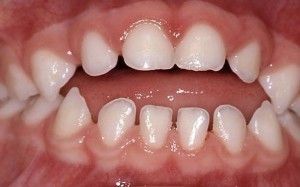How Using a Pacifier too Long can Lead to Crooked Teeth, Tongue Thrust, Pacifier Teeth, and More.
Pacifiers are often used to help soothe infants by satisfying their natural sucking reflex. However, after 6 months. The risks begin to outweigh the benefits of pacifier use. Extended pacifier use increases a child’s risk of developing dental problems. Which can affect their ability to produce certain speech sounds. As a child’s mouth begins to develop, it will grow around anything that is repeatedly held inside. Teeth may also become crooked and misaligned. Problems may be seen in regards to the child’s bite and jaw position. This is commonly referred to as an “open bite” or “pacifier teeth.” Prolonged pacifier use can also promote an infantile swallow pattern. Resulting in a tongue thrust. A tongue thrust is when the tongue protrudes between the front teeth during speech and swallowing.

Open Bite is a condition resulting from extended pacifier use after 6 months of age.
Most children’s language takes off around the age of 12-18 months. Communication can become interrupted if the child is using a pacifier for extended periods by the time they are verbally communicating their wants and needs. It is recommended to limit a child’s pacifier use to 6 months. And to stop pacifier use completely by 2 years. If your child is experiencing a tongue thrust or distorted speech sounds.
Contact a speech-language pathologist for additional information and treatment.